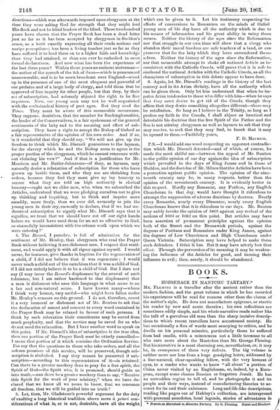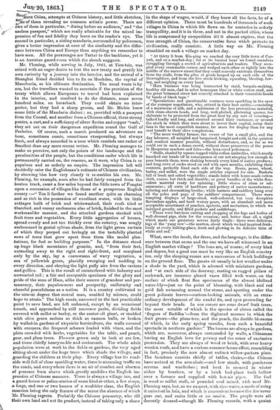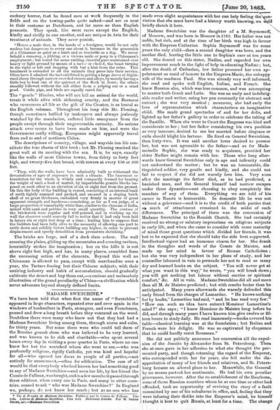BOOKS.
HORSEBACK IN MANTCHU TARTARY.*
Mn. FLEmiNG is a traveller after the ancient rather than the modern fashion, and the great volume in which he has recorded his experiences will be read for reasons other than the charm of the author's style. He does not manufacture epigrams, or startle his reader by new and acute theories ; his own reflections are sometimes oddly simple, and his whole narrative reads rather like the talk of a garrulous old man than the sharp incisive descrip- tions to which recent travellers have accustomed society. He has occasionally a flux of words most annoying to critics, and he dwells on his personal miseries, particularly those he suffered from bad smells, with a minuteness not a little tiresome to all who care more about the Mantchus than Mr. George Fleming. But his narrative is a most charming one, nevertheless, or, it may be, in consequence of these very defects. The big volume is neither more nor less than a huge gossiping letter, addressed by a fine-natured, clear-speaking fellow, with the very keenest of eyes, to a reader who wants to know "all about" a portion of China never visited by an Englishman, or, indeed, by a Euro- pean, except some chance Russian or forgotten Jesuit. He has an untroddeu region to tell of, and be photographs it and its people and their ways, instead of manufacturing theories to ac- count for its and their existence. Long and life-like descriptions, reading like pages out of Ilakluyt's collection, are interspersed with personal anecdotes, local legends, stories of adventures in * Travels on Horseback in Manidiu Tartary. By G. Fleming. Hurst and Blackett 8".dern China, attempts at Chinese history, and little sketches,
sow
sette of them revealing no common artistic power. There are ,two of them in particular," dining before an audience," and "the useless passport," which are really admirable for the mixed im- pression of fun and fidelity they leave on the reader's eye. The second in particular, a sitting mandarin, surrounded by policemen, gives a better impression at once of the similarity and the differ- ence between China and Europe than anything we remember to have seen. All the personages are Tartar to the backbone, yet it is an Austrian guard-room which the sketch suggests.
Mr. Fleming, while serving in July, 1861, at Tien-tsin, was seized with an eager desire to test the new treaty and gratify his own curiosity by a journey into the interior, and the arrival of a Shanghai friend decided him to fix on Moukden, the capital of Manchuria, as his ultimate destination. The usual route is by sea, but the travellers wanted to ascertain if the provision of the treaty which allows Europeans to travel had been explained in the interior, and resolved to do the distance, some seven hundred miles, on horseback. They could obtain no inter- preter, but they had a sharp groom, and Mr. Michie knew some little of the Mandarin dialect ; so, provided with a passport from the Consul, and another from a Chinese official, three strong ponies, a cart, and a sufficiency of silver florMs and copper "cash," they set out on their dangerous expedition round the Gulf of Pechelee. Of course, such a march produced an adventure an hour, sometimes comic, sometimes exasperating, but always fresh, and always recorded in a tone which reminds one rather of Smollett than any more recent writer. Mr. Fleming manages to make us perceive, not only the points of the landscape and the peculiarities of the people, but the conditions under which life is permanently carried on, the reasons, as it were, why China is so populous and so orderly an empire. The impression left will -decidedly raise the Englishman's estimate of Chinese civilization, by showing him how very closely it reiembles his own. Mr. Fleming, for example, soon after he had fairly escaped from the beaten track, came a few miles beyond the little town of Fungtai upon a succession of villages like those of a prosperous English -county :—" Ten Ii further we found another quite as charming and as rich in the possession of excellent water, with its little cottages built of brick and whitewashed, their roofs tiled or thatched, and roomy enclosures also of brick, finished in the most workmanlike manner, and the attached gardens stocked with fruit trees and vegetables. Every little aggregation of houses, -spread evenly and not too thickly, over the country, was snugly embosomed in genial sylvan shade, from the light green curtain of which they peeped out lovingly on the tastefully planted rows of trees that grew apart from them like model plan- tations, for fuel or building purposes." In the distance stood up huge black mountains of granite, and, "from their feet, extending away to the right and right-front, and margined only by the sky, lay a cosmorama, of wavy vegetation, a sea of yellowish green, placidly sweeping and nodding in -every direction, and obeying the light puffy airs from the ravines and gullies. This is the result of uninterfered-with industry and unwearied toil ; a fair and acceptable specimen of the glory and pride of the sons of Ham, alike their source of grandeur and per- manency, their populousness and prosperity, uniformity and cheerful peacefulness as a nation. It is a country cultivated to the utmost degree that mortal man, unaided by science, could hope to attain.' The high roads, narrowed to the last practicable point to save land, are left unfenced, except by an occasional trench, and approached by still narrower paths, dividing fields covered with millet or barley, or the castor-oil plant, or studded with olive green melons as thick as cannon balls, or broken by walled-in gardens of exquisite horticulture, the walls covered with creepers, the frequent arbours loaded with vines, and the plots crowded with herbs, vegetables for the table, and peach, pear, and plum trees. Flowers grown only to look at are few, and those chiefly honeysuckle and cockscomb. The whole adult population were at work in the fields or gardens, the very aged sitting about under the huge trees which shade the village, and
guarding the children at their play. Every village has its road- side well full of clear sparkling water, there is streaming traffic on the roads, and everywhere there is an air of comfort and absence of pressure from above which greatly modifies the English im- pression of Chinese manners. There is always a village inn, and
a guard-house or police-station of some kind or other, a few shops,
a forge, and one or two houses of a wealthier class, the English mansion being the only feature of the scene the absence of which Mr. Fleming regrets. Probably the Chinese peasantry, who till their own land and eat its product, instead of taking only a share in the shape of wages, would, if they knew all the facts, be of a different opinion. There must be hundreds of thousands of such villages in China in which life flows on for centuries in orderly tranquillity, and it is in these, and not in the packed cities, where life is compressed by competition till it almost expires, that the true strength of China, the conservative force which protects its civilization, really consists. A little way on Mr. Fleming stumbled on such a village on market day.
"At thirty li from Kia-ping we reached the cosy little town of Coo- yuh, and on a market-day ; for at its busiest hour we found ourselves struggling through a crowd of agriculturists and traders. They occu- pied every crammable corner, and wedged each other so tightly into the middle of the narrow street that they could scarcely extricate themselves from the stalls, from the piles of goods heaped up on each side of the thoroughfare, and from the live stock kicking, squealing, bleating, low- ing, and neighing on every hand.
"Here business was being transacted by staid, bargain-making, healthy old men, clad in sober homespun blue or white cotton stuff, and the great brimmed straw hat scarcely attached to their venerable heads by bands of black tape."
"Speculations and questionable ventures were sparkling in the eyes of the younger negotiators, who, attired in their best outfits—consisting of a maximum of silk, and a minimum of the less pretentious material, with clean-shaven heads, and long, well-plaited, glistening queues, too elaborate to be protected from the great heat by any sort of covering— talked loudly and long, and strutted around their customer, or around the stock in which they were about to invest their capital, using their fans in the most coquettish manner, far more for display than for any real benefit to their olive complexions.
"The more wealthy farmer, the owner of but a small plot, and the day labourer, all mingled and bargained, bought and sold, in the quietest and readiest manner possible, without disturbance, and, so far as we could see in such a dense crowd, without those preservers of the peace in Hesperian markets and fairs—the lynx-eyed policemen.
"Stalls, shaded by square-topped white cotton umbrellas, which nearly knocked our heads off in consequence of our not stooping low enough to pass beneath them, were shaking beneath every kind of native produce; and long rows of sacks stood on end with open mouths, exhibiting their contents, perfectly lined each side of the way. Beans, pease, wheat, barley, and millet, were the staple articles exposed for sale. Baskets full of fresh and salted vegetables ; stands laden with home-made cotton cloth, coarse, but thick and durable ; or great bundles of the white floc- culent material ready for spinning ; little stores of alum or sal- ammoniac; all sorts of hardware and pottery of native manufacture ; tailoring and shoemaking booths ; while harness and saddlery hung over all the poles and pegs of the saddlers' compartment. There were tempting displays of large-sized, well-coloured, but very deceptive flavourless apples, and hard watery pears, with an abundant and more acceptable assortment of peaches, apricots, and nectarines, in which we indulged greatly, and filled pockets and saddlebags.
"There were butchers cutting and chopping at the legs and bodies of well-dressed pigs, slain for the occasion ; and, better than all, a sight which made our gustatory nerves fairly tingle : there were delicious legs of the yang row'—the mutton, about which we had inquired fruit- lessly at every halting-place, fresh and glowing in its delicate tints of white and red."
What, save the locale, the dress, and the language, is the differ- ence between that scene and the one we have all witnessed in an English market village ? The inns are, of course, of every kind and degree, but a good one must be very like an English country inn, only the sleeping rooms are a succession of brick buildings on the ground floor. The guests sit usually in hot weather under a shade in the yard, which is adorned with miniature gardens, and "at each side of the doorway, resting on rugged pillars of rockwork, are immense glazed vases filled with water, on the surface of which float fine specimens of the almost idolized water-lily—just on the point of blooming, with black and red gold fish swimming around the stems, and sporting under the great palmate leaves—curious-looking animals, with an extra- ordinary development of the caudal fin, and eyes protruding far beyond their heads. In one corner are some dwarf fruit trees, the most notable of which is the species of citron called the fingers of Buddha '—from the digitated manner in which the fruit grows—the plum-tree, and the peach, the double blossoms of which, in the early spring months, form such a beautiful spectacle in northern gardens." The houses are always in gardens, which are, moreover, always surrounded by walls, a Chinaman having an English love for privacy and the sense of exclusive possession. They are always of wood or brick, with over heavy wooden roofs, and have a curious summer-house effect, resembling in fact, precisely the now almost extinct willow-pattern plate. The furniture consists chiefly of tables, chairs,—the Chinese have arrived at the arm-chair,—and low stools, with ponderous screens and wardrobes ; and beat is secured in winter either by braziers, or by a brick bed-place built hollow over a furnace and supplied with hot-air pipes. The fuel is wood or millet stalk, or pounded coal mixed, nith mud Mr. Fleming says, but, as we suspect, with rice-water, a mode of using it universal in Asia, and which is convenient because the fire never goes out, and emits little or no smoke. The people were all decently dressed—though Mr. Fleming records, with a quaint
cockney horror, that he found men at work frequently in the fields and on the towing-paths quite naked—and are as neat in their costume as Dutchmen, and far more so than English peasants. They speak, like most races except the English, kindly and civilly to one another, and are unique in Asia for their treatment of animals. They never punish.
"Hence a mule that, in the hands of a foreigner, would be not only useless but dangerous to every one about it, becomes in the possession of a Chinaman as quiet as a lamb and as tractable as a dog. We never beheld a runaway, a jibbing, or a vicious mule or pony in a Chinaman's employment ; but found the same rattling cheerful pace maintained over heavy or light ground by means of a turr-r or cluck-k, the beast turning to the right or left and stopping with but a hint from the reins. This treatment is extended to all the animals they press into their service. Often have I admired the tact exhibited in getting a. large drove of fright- ened sheep through narrow crowded streets and alleys, by merely having a little boy to lead one of the quietest of the flock in front; the others steadily followed without the aid either from a yelping cur or a cruel goad. Cattle, pigs, and birds are equally cared for."
The " gentle " Hindoo, who will not kill an animal for the world, treats it while alive with sickening cruelty, and the Burmese who reverences all life as the gift of the Creator, is as brutal as the English cabman. Throughout his long ride Mr. Fleming, though sometimes baffled by innkeepers and always jealously watched by the mandarins, suffered little annoyance from the people except through their ungovernable curiosity. No serious attack ever seems to have been made on him, and were the Government really willing, Europeans might apparently travel from end to end of northern China.
The descriptions of country, village, and wayside inn life con- stitute the true charm of this book ; but Mr. Fleming reached the great wall at its meeting with the sea. It is, he says, exactly like the walls of most Chinese towns, from thirty to forty feet high, and twenty-five feet broad, with towers at every 150 or 200 feet.
They, with the walls, have been admirably built to withstand the devastations of ages of exposure in such a climate. The basement or foundation for the whole is widely and compactly formed for bearing the weight of such a load of matter, by imperishable granite blocks im- posed on each other to an elevation of six or eight feet from the ground. On this the body of the building is reared, consisting of an internal bank of earth tightly rammed and packed, and encased in a sloping brick shell of no great thickness, embedded very firmly in mortar of great apparent strength and hardness—consisting, so far as I can judge, of a large proportion of remarkably white lime, similarto the chunam of India, mixed with sand and pebbles in very small quantity. The courses of the brickwork were regular and well pointed, and in working up the wall the observer could scarcely fail to notice that it had only been laid in layers six or eight feet deep at a time ; leading him to suppose that the builders had been fully alive to the necessity of allowing one part to settle down and solidify before building any higher, in order to prevent displacement and speedy demolition from premature shrinking.'
The bricks are large, and of a dark slate colour. The wall crossing the plains, gliding up the mountains and crossing ravines, irresistibly strikes the imagination ; but on the hills it is not above eight feet high, and has, in many places, crumbled from the unceasing action of the elements. Beyond this wall no Chinaman is allowed to pass, except with merchandise once a year, the Tartars fearing lest their Chinese subjects, with their untiring industry and habit of accumulation, should gradually cultivate the desert and buy them out,—a curious and melancholy illustration of the grand peculiarity of China—a civilization which never advances beyond sharply defined limits.
































 Previous page
Previous page